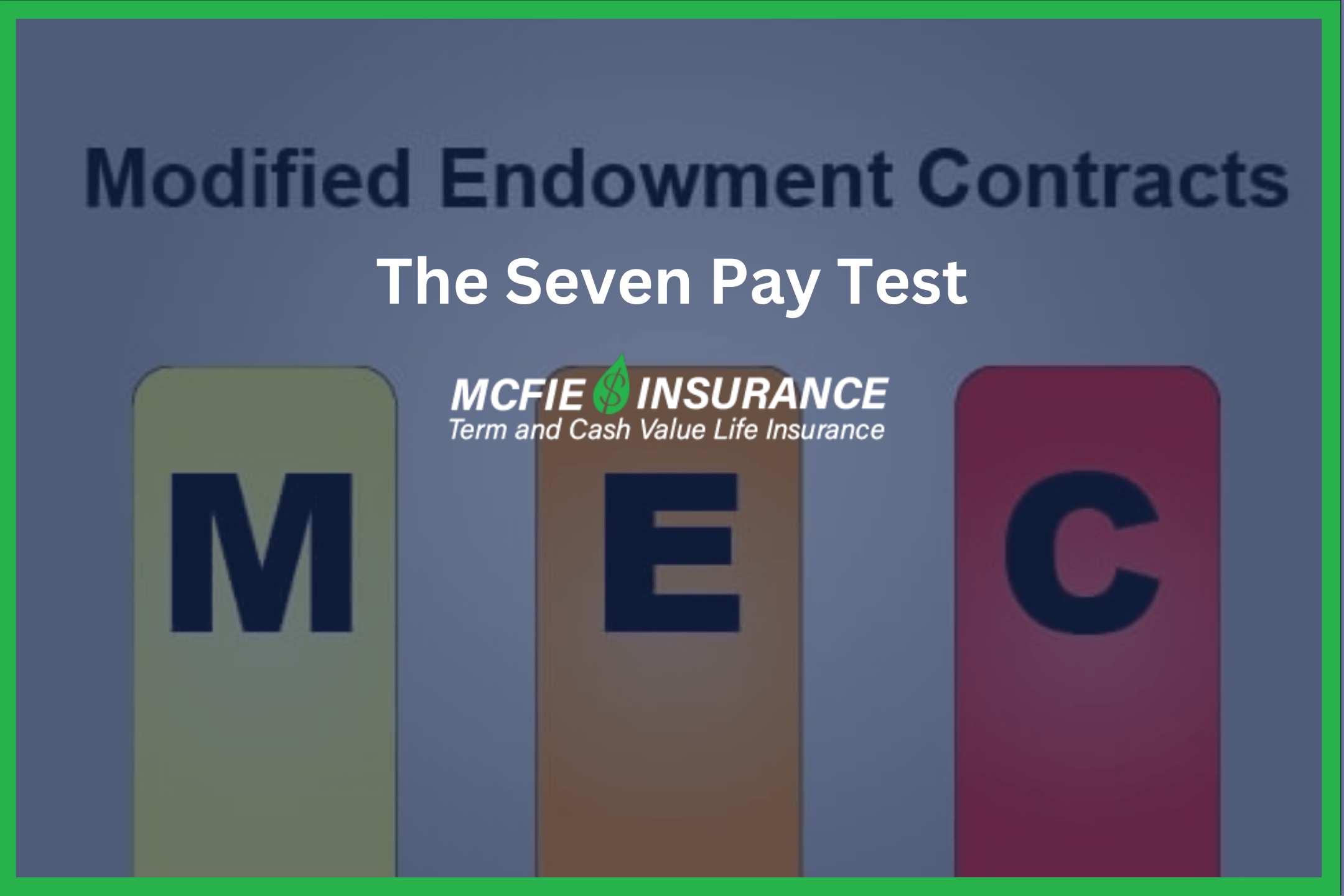702-660-7000
702-660-7000

The seven pay test determines whether a permanent life insurance policy is classified as a modified endowment contract (MEC). Within the first seven years, the total amount paid in premiums must not exceed the sum needed to fully fund the policy in seven years. If it does, the policy is considered a MEC.
Becoming a MEC changes the tax rules for a life insurance policy. Normally, permanent life insurance benefits from a “first-in, first-out” tax system, which is advantageous for policyholders. This means that when you take money from your policy, it’s not immediately taxed. However, if a policy becomes a MEC, this benefit is lost. Withdrawals and loans against the policy’s cash value are taxed right away, unlike with non-MEC policies.
The IRS also uses the seven pay test to check how the premiums paid into the policy stack up against the policy’s cash value growth. This helps them ensure that the policy is being used for its intended purpose of providing insurance rather than as a tax-advantaged investment vehicle.
For Universal Life Insurance policies, which include traditional, indexed, and variable types, a policy can gain MEC status due to “overfunding.” This happens when you pay more in premiums than what’s needed just for the insurance coverage. Cash values in these policies can grow not only from these extra premium payments but also from the interest these excess payments earn. Even overpaying a policy loan can lead to a MEC. Interestingly, no matter the way cash value increases, if it goes beyond what the IRS allows under the seven pay test rules, the policy turns into a MEC.

Understanding the Infinite Banking Concept and How It Works In Our Modern Environment 31-page eBook from McFie Insurance Order here>
In whole life insurance, the cash value increases because the policy gains equity over time. This is different from universal life insurance. In whole life insurance, the basic coverage gradually turns into what’s known as paid-up insurance. When this happens, there’s no more premium due on that part of the coverage, so it becomes the policyholder’s equity.
If you decide to give up some of your paid-up insurance, the insurance company has to pay you back for it. If you don’t, the value you could get if you surrendered the policy keeps growing as more of your coverage becomes paid-up.
Just like with universal life insurance, it’s possible to put too much money into a whole life policy. If you do this beyond what the IRS allows in its seven pay test, your policy becomes a MEC. To overfund a whole life policy to the point it becomes a MEC, you could either:
Even after the first seven years without turning into a MEC, a policy isn’t safe from the seven-pay test. If there are any changes to the benefits, premiums, or terms of the policy at any time after those seven years, the policy has to go through the seven-pay test again.
So, if a policy is adjusted in any way that affects its benefits, premiums, or contract terms, it needs to clear the seven-pay test once more to steer clear of becoming a MEC.
This means the seven-pay test continuously applies to permanent life insurance policies. Therefore, it’s important for all owners of permanent policies to keep this in mind. If your policy ever becomes a MEC, you’ll need to act quickly to change it back if you want to avoid the unfavorable tax consequences that come with MEC status in the future.
Usually, people try to avoid their policies becoming MECs, but sometimes there are valid financial reasons to deliberately make a policy a modified endowment contract, which doesn’t meet the seven-pay test requirements.
At McFie Insurance, our expertise lies in crafting term and whole life insurance policies tailored to our clients’ financial needs. We take care of understanding the complexities of the seven-pay test and how it impacts policy design, so you don’t have to worry about the details.
If you’re interested in how a policy can be customized for you, give us a call at 702-660-7000 and request a strategy session.
 Dr. Tomas P. McFie
Dr. Tomas P. McFie
Most Americans depend on Social Security for retirement income. Even when people think they’re saving money, taxes, fees, investment losses and market volatility take most of their money away. Tom McFie is the founder of McFie Insurance which helps people keep more of the money they make, so they can have financial peace of mind. His latest book, A Biblical Guide to Personal Finance, can be purchased here.